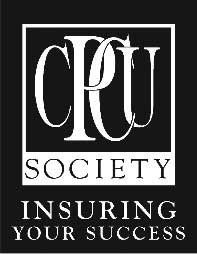
The Malvern, Pennsylvania-based Chartered Property Casualty Underwriters (CPCU) Society is a community of credentialed property and casualty insurance professionals formed in 1944 to promote ethical practices and continuing education among insurance professionals.
The CPCU’s nearly 30,000 members hold the Chartered Property Casualty Underwriter (CPCU) designation, which requires passing rigorous undergraduate and graduate-level examinations, meeting experience requirements, and agreeing to be bound by a strict code of professional ethics. As the organization’s mission statement states, “The CPCU Society is dedicated to meeting the career development needs of a diverse membership of professionals who have earned the CPCU designation, so that they may serve others in a competent and ethical manner.”
Top-Shelf Credentials
CPCU is a highly-regarded designation and is a senior credential for insurance professionals in the property and casualty industry.
The New York chapter, which was founded in 1950 and has just over 500 members, is headed by AIG’s George Corde. Chapter leadership is determined by both election and appointment, depending upon the position. The Greater New York area also has CPCU chapters located in Westchester County, Long Island, Southern Connecticut and two in New Jersey.
Corde, who was installed in June, said the organization’s mission is to support the needs of the area’s insurance professionals in a variety of ways. “I want our chapter to be the premier insurance association in the city of New York as recognized by not only the insurance industry but also the business community at large,” said Corde in a recent phone interview. “My vision is that our chapter be viewed as the most prestigious, relevant and visible professional insurance association in the greater New York area. Our mission is to meet the career development needs of a diverse membership of professionals who have earned the CPCU designation, so that they may serve others in a competent and ethical manner.”
Some of that support network includes, of course, professional development of its members; mentoring students and others in the community; and providing continuing education and leadership training so that the benefits of membership continue, he said.
Corde said that to better service the membership, he also intends to improve the organization’s activities in the following areas: communications—to internally improve communications with the members so that everyone knows what the chapter is doing and where they are going, and externally, to improve visibility with local employers and other insurance associations and the business community.
He also wants to grow the membership, which now stands at around 500 CPCU-accredited professionals out of the thousands or so working in the New York area. The membership brings together many in the insurance field, including brokers, agents, underwriters, claims adjusters, auditors, and lawyers, among others. He encourages the members to join the chapter’s committees, which consist of communications, meetings, membership, connections and sponsorship.
Benefits of Accreditation
According to James L. Britt, president of the national society for 2007-08 and a managing director with Marsh USA in Charlotte, North Carolina, those currently pursuing the CPCU designation must complete eight exams and five core courses in various industry foundations, such as the theory of risk. The other three segments have an emphasis on either commercial or personal insurance.
“CPCU provides a foundation in terms of credentialing,” says Britt. “The course content is high level higher education study. In effect, it works well for someone who comes into the industry with a general business or an arts and science degree. I entered with a degree in history from North Carolina, and I needed to have a foundation in the insurance industry. It is absolutely the best foundational course there is. It’s not intended to make someone an insurance scholar, but it is the foundation for an outstanding student of the business.”
Britt, an industry veteran with 40-plus years in the insurance field, adds that professionals entering the field with risk and insurance majors often have one or more parts of their credentialing completed as an undergraduate and quickly complete the exams to excel in the industry. Britt himself says he has found his own CPCU designation invaluable. “It’s amazing at how many junctures in my career have presented opportunities for me to lean on my foundational learning,” he says.
The CPCU designation embraces a covenant of lifelong learning. Society members may take advantage of the offerings of 150 chapters in the U.S. and a growing number of world insurance capitals. New chapters are flourishing throughout Europe, and in Bermuda, Tokyo and Seoul, and all offer continuing education courses and seminars to their members.
Outreach to Community
Like its umbrella organization does at the national level, the New York chapter is also strongly focused on education, said Corde. They were in fact, instrumental about 10 years ago in establishing the insurance curriculum at Murry Bergtraum High School, members participate in the school’s career day, and serve on its business advisory council. They’ve sort of adopted the Lower Manhattan-based business school, noted Corde.
Members volunteer as advisors on student projects such as the New York City Department of Education’s Virtual Enterprises program (VEP). Through the VEP, students actually run an insurance company and learn the workings of the business world. Bergtraum students, he said, regularly participate in the VE Business Plan Competition, one of the integral components of the VEP. This applied learning activity, offers participants the opportunity to actualize the world of work—applying communication skills, using technology, engaging in teamwork and applying economic and financial concepts as they trade in the global marketplace. The students actually were pretty successful and came in second, he said. The New York chapter also has traditionally awarded thousands of dollars in college scholarships to selected insurance program participants, added Corde.
The chapter’s regular monthly meetings, all of which are open to the public, typically feature a speaker on an insurance topic of interest. Many of these meetings are state certified to provide continuing education credits for broker and agent licensing. The chapter also runs or sponsors several half-day professional development programs during the course of the year and an Insurance Day (I-day) in May. The capstone meeting for the New York chapter is the annual Conferment Meeting where upon 22 new CPCU designees will be conferred. The event also features and industry leading speaker. This year’s event will be held on November 11th at Cipriani at 55 Wall Street downtown.
Looking Ahead
With a growing number of members, CPCU is looking toward the future and addressing the challenges that come with a new generation of members from the Baby Boomers all the way to Generation X and Y.
“Our short term goals are to meet the needs of a diverse group of members,” said Corde. “We have young and old, urban dwellers as well as people who commute into the city every day. Our work invariably impacts directly on the real estate industry, from construction, environmentalism, property management, lending and related risk management areas. We will be there for them.”
Stephanie Mannino is a freelance writer and a frequent contributor to The Cooperator.






Leave a Comment